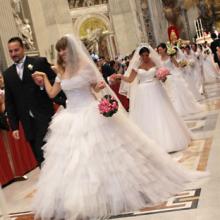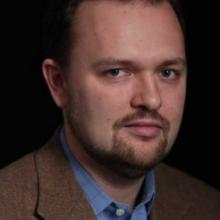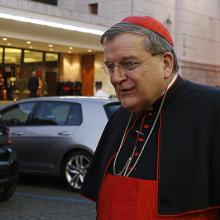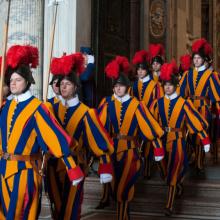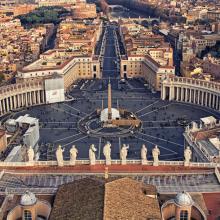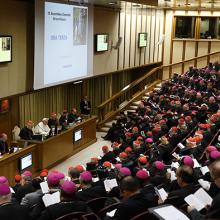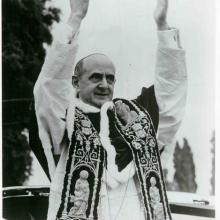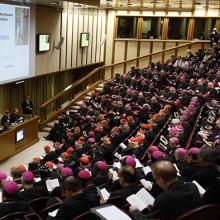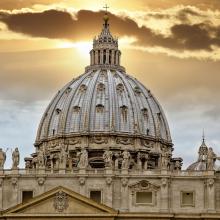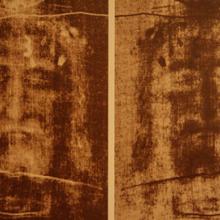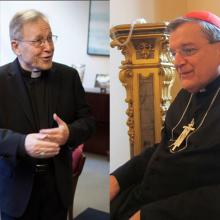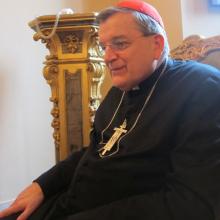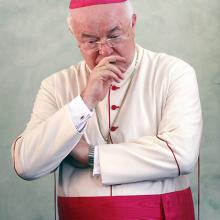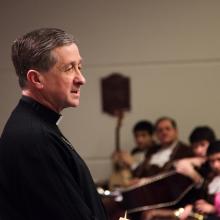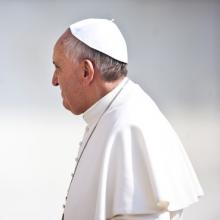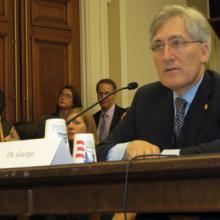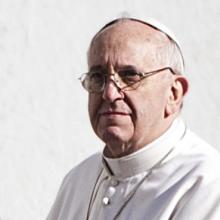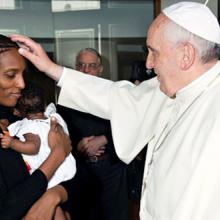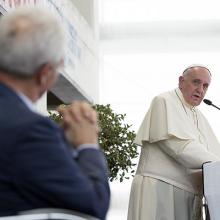vatican
Pope Francis raised the prospect of no-cost marriage annulments on Nov. 5 after revealing he had dismissed a church official for selling annulments for thousands of dollars, which he called a “public scandal.”
The pontiff made the shocking disclosure as he was addressing canon lawyers at the Vatican for a course on marriage dissolution conducted by the Roman Rota, the church’s highest court.
“We have to be careful that the procedure does not become some kind of business,” the pope said. “There have been public scandals.”
“I had to dismiss a person from a tribunal some time ago who said: ‘Give me $10,000 and I’ll take care of both the civil and ecclesiastical procedures.’ Please, not this!”
Francis did not provide any more details about where or when the sacking occurred. He stressed the need for the church’s annulment procedures to be easier, faster and cheaper. He even suggested fees could be waived.
“When you attach economic interests to spiritual interests, it is not about God,” he said.
Many conservative Catholics have long viewed Pope Francis with suspicion thanks to his effort to shift the church’s focus away from a culture war agenda and toward a more welcoming approach and a greater emphasis on serving the poor.
But last month’s controversial Vatican summit on the modern family, with the push by Francis and his allies to translate that inclusive view into concrete policies on gays and divorced and remarried Catholics, for example, seems to have marked a tipping point, with some on the right raising the specter of a schism — a formal split that is viewed as the “nuclear option” for dissenters.
New York Times columnist Ross Douthat, a Catholic and a conservative, crystallized the peril in an Oct. 25 column warning the pope not to “break the church” to promote his goals, saying that if Francis continues to alienate conservative Catholics it could lead to “a real schism.”
Douthat had raised the possibility of “an outright schism” earlier this year, as well, and his warnings have been echoed by a number of other church leaders and commentators. The anxiety on the right has also drawn increasing media speculation about the possibility of conservatives splintering off.
So is a schism, with its echoes of medieval debates and heretics burning at the stake, a realistic possibility? And can an independent Catholic church be successful in the modern world?
American Cardinal Raymond Burke, the feisty former archbishop of St. Louis who has emerged as the face of the opposition to Pope Francis’ reformist agenda, likened the Roman Catholic Church to “a ship without a rudder” in a fresh attack on the pope’s leadership.
In an interview with the Spanish Catholic weekly Vida Nueva, published Oct. 30, Burke insisted he was not speaking out against the pope personally but raising concern about his leadership.
“Many have expressed their concerns to me. At this very critical moment, there is a strong sense that the church is like a ship without a rudder,” Burke said.
“Now, it is more important than ever to examine our faith, have a healthy spiritual leader and give powerful witness to the faith.”
Burke is the current head of the Vatican’s highest court known as the Apostolic Signatura, but he said recently he is about to be demoted. There is speculation he will be made patron of the Order of Malta, a largely ceremonial post.
“I have all the respect for the Petrine ministry and I do not want to seem like I am speaking out against the pope,” he said in the interview. “I would like to be a master of the faith, with all my weaknesses, telling a truth that many currently perceive.”
“They are feeling a bit seasick because they feel the church’s ship has lost its way,” he added.
They say you can feast like a king, and now you can eat like a pope after a young chef from the Vatican’s Swiss Guards published a cookbook featuring the favorite recipes of Pope Francis and his predecessors.
David Geisser, 24, who joined the elite Vatican security corps only a month ago, released his book, titled “Buon Appetito,” in Rome on Oct. 21.
The cookbook includes recipes for Francis’ favorite dishes, such as empanadas; roast sirloin, known as “colita de cuadril”; and “dulce de leche,” a milk-based Argentinian dessert that began appearing on Vatican dining tables when the archbishop of Buenos Aires was elected pope last year.
But it also features one of St. John Paul II’s favorite dishes, Polish pierogi, or stuffed dumplings, and Bavarian delicacies favored by Pope Emeritus Benedict XVI.
Pope Francis and senior Catholic leaders wrapped up their two-week Vatican summit on the challenges of modern family life on Oct. 19 without reaching a consensus on a number of hot-button topics. So where does that leave Francis’ papacy? And the church?
Here are seven takeaways:
1. Hard-liners won the battle
A midpoint status report on the debate among some 190 cardinals and bishops was described as a “pastoral earthquake” because of its unprecedented (for Catholic churchmen) language of welcome of and appreciation for gay people, as well as divorced-and-remarried Catholics and cohabiting couples.
The media tsunami over that apparent breakthrough panicked conservatives, who waged an intense public and private campaign to make sure none of that language — apparently favored by Francis himself — made it into the synod’s final report. They succeeded, and even the few watered-down paragraphs on gays and remarried Catholics did not reach the two-thirds threshold needed for formal passage.
Hard-liners claimed victory, and headlines spoke of Vatican “backtrack” and a “resounding defeat” for Francis that left his papacy “weakened.”
The tug-of-war at the Vatican over calls for the Catholic Church to be more open to gays and cohabiting couples intensified Oct. 16 as conservative bishops sought to rein in or renounce draft language they feared might condone lifestyles not in accord with church teachings.
The lobbying at the two-week summit of church leaders — a synod on family life that is set to wrap up Saturday with a final report — was epitomized by the retranslation of a headline from “welcoming homosexual persons” to “providing for homosexual persons.”
In the text, the line “Are we capable of welcoming these people, guaranteeing to them a fraternal space in our communities?” was changed to, “Are we capable of providing for these people, guaranteeing … them … a place of fellowship in our communities?”
The change in the English version was not made in the Italian original, where the term “accogliere,” which means “to welcome,” was kept.
The Vatican’s chief spokesman, the Rev. Federico Lombardi, said the first document was only a “transitory text” and suggested there were errors in translation.
As he wraps up a Vatican meeting marked by sharp debates over sex and morality, Pope Francis on Oct. 19 will honor one of his most controversial predecessors by beatifying Pope Paul VI, who is most famous for reaffirming the Catholic Church’s ban on artificial contraception.
Beatification puts Paul one step shy of formal sainthood. The move might seem out of step with Francis’ pastoral approach given that Paul’s birth control ruling, in the 1968 encyclical “Humanae Vitae,” set the stage for the culture wars that overtook Catholicism after Paul died in 1978.
A wide swath of Catholics, especially in the U.S. and Europe, were furious over Paul’s decision. They were convinced that the ban would be lifted and that Paul was shutting down the reforms that had begun a few years earlier with momentous changes adopted by the Second Vatican Council.
Many conservatives, on the other hand, hailed “Humanae Vitae” for reasserting traditional doctrine, and the division foreshadowed the deep splits that have played out even in this month’s high-level synod in Rome — a polarization that Francis says he wants to overcome.
Yet Francis is trying to accomplish that goal by focusing not so much on “Humanae Vitae” but on Paul VI’s many other groundbreaking, though often overlooked, contributions:
A midpoint report from this month’s Synod of Bishops reveals that Catholic leaders are considering more conciliatory language toward gays and lesbians, divorced and remarried Catholics, and couples who live together before getting married.
Meeting with nearly 200 senior prelates and several dozen lay experts and observers at the Vatican, Pope Francis has deliberately engineered a lively discussion of issues concerning marriage and family life. This assembly, and a follow-up summit in 2015, will help shape the pontiff’s legacy.
Reporters and commentators are producing a flurry of analysis mostly centered on the question of whether the synod portends a change in substance or merely a change in tone. Such is the abiding question of Francis’ papacy.
Yet through these lively debates in Catholic life runs a theme that is as old as the Reformation: the role of individual conscience.
The world’s Catholic bishops on Oct. 13 signaled a move toward greater tolerance of gays and lesbians, an about-face so unexpected that leaders of the church’s right wing called it a “betrayal.”
Noting that gays and lesbians have “gifts and qualities” to offer the church, the mid-point assessment reflected the impact that Pope Francis seems to be having on the two-week Synod on the Family as he pushes for a more open, less doctrinaire approach.
“Are we capable of welcoming these people, guaranteeing them a fraternal space in our communities?” said the communique from the nearly 200 bishops and lay delegates. “Often they wish to encounter a church that offers them a welcoming home.
“Are our communities capable of providing that, accepting and valuing their sexual orientation, without compromising Catholic doctrine on the family and matrimony?”
A 14-foot-long stretch of cloth mysteriously imprinted with a faint, brownish image of a naked man and wounds that mirror those of a crucifixion has inspired decades of debate over whether it could be Jesus’ burial shroud.
This weekend, that debate will take center stage in St. Louis.
Forty experts, scientists and enthusiasts are introducing the latest research surrounding the so-called burial cloth of Jesus at an international four-day conference, opening Oct. 9.
Russ Breault, who first became interested in the Shroud of Turin when he wrote about it for his college paper, will deliver the opening talk that will focus on how the pattern of wounds seen on the shroud — markings consistent with a crown of thorns, a pierced wrist and what appear to be blood stains — correlate with what the Gospels say happened to Jesus.
For Breault, the question — “Could this be the burial cloth of Jesus?” — is one worthy of rigorous pursuit.
Pope Francis is tipped to win this year’s Nobel Peace Prize, according to some of the world’s leading bookmakers.
The Argentinian pope is currently the 5-2 favorite to win the award, which will be announced by the Nobel Institute in Oslo, Norway, on Oct. 10, according to British bookmaker William Hill. Irish bookmaker Paddy Power also considers him a leading contender.
The pontiff’s odds have fallen from 11-4 in a sign of his worldwide popularity.
“When the odds get shorter, that’s when you sit up and pay attention,” said Jon Ivan-Duke, spokesman for William Hill. “Maybe there’s some divine inspiration at work.”
Nevertheless, Francis is facing stiff competition from National Security Agency whistleblower Edward Snowden and U.N. Secretary-General Ban Ki-Moon.
Leading up to a Vatican summit on family life that Pope Francis opens on Oct. 5, high-ranking churchmen have fiercely debated church teaching — and criticized each other — in sharp exchanges that offer a ringside seat to the kind of battles that Rome used to keep under wraps.
But amid all this verbal sparring, the opposing camps have found one point of consensus: Airing their differences is good for the Roman Catholic Church.
“Everybody is free to express his opinion. That is not a problem for me,” Cardinal Walter Kasper, a German theologian who has emerged as the point man for the reformists, said in an interview published Sept. 29 in America magazine.
“The pope wanted an open debate, and I think that is something new because up to now often there was not such an open debate. I think that’s healthy and it helps the church very much.”
A day later, Cardinal Raymond Burke, an American who heads the Vatican’s highest court and a vocal exponent of the conservative camp opposing Kasper, spoke to reporters to toss back a few barbs. But he, too, praised the frankness of the exchanges.
Public disagreements over whether the Roman Catholic Church can change its teachings on Communion for remarried Catholics are growing sharper on the eve of a major Vatican summit, with conservatives led by U.S. Cardinal Raymond Burke making another push against loosening the rules.
In a conference call with reporters on Sept. 30, Burke, who currently heads the Vatican’s high court, singled out the leading proponent of reforms, German Cardinal Walter Kasper, and his claims that critics of his proposals are really attacking Pope Francis.
Kasper has said that the pope supports his efforts to find ways to fully reintegrate divorced and remarried Catholics into church life. The proposals have become a prime focus of the upcoming Vatican meeting, called a synod, which will convene on Oct. 5 for two weeks to consider changes in family life in the modern world.
“I find it amazing that the cardinal claims to speak for the pope,” said Burke, the former archbishop of St. Louis, speaking from Rome. “The pope doesn’t have laryngitis. The pope is not mute. He can speak for himself. If this is what he wants, he will say so.”
Pope Francis had ordered the arrest of a former Polish archbishop accused of child sex abuse in the Dominican Republic because the case was “so serious,” the Vatican said Sept. 23.
Jozef Wesolowski, who was defrocked by a Vatican tribunal earlier this year, is under house arrest inside Vatican City due to the “express desire” of Pope Francis, the Vatican said in a statement.
“The seriousness of the allegations has prompted the official investigation to impose a restrictive measure that … consists of house arrest, with its related limitations, in a location within the Vatican City State,” the Vatican’s chief spokesman, the Rev. Federico Lombardi, said.
Wesolowski was removed from his position in the Dominican Republic and recalled to the Vatican in August 2013 amid claims that he had abused boys in Santo Domingo.
The former archbishop is awaiting trial on criminal charges at the Vatican and could eventually face charges in the Dominican Republic and in his native Poland.
When Spokane Bishop Blase Cupich got a call 10 days ago with the news that Pope Francis had chosen him to be the next archbishop of Chicago — the pontiff’s most important U.S. appointment to date — he was so taken aback that he couldn’t speak for a few moments.
“To say that I was surprised doesn’t come close to the word I would use,” Cupich said Sept. 20 at a news conference in Chicago introducing him as the successor to Cardinal Francis George, who is 77 and battling cancer.
Asked by reporters how long it took for the reality of his appointment to sink in, Cupich smiled and said, “It’s still sinking in.”
A lot of other Catholics are trying to absorb the news as well, just as surprised that Francis picked the 65-year-old Cupich, who had been considered a long shot by many Vatican handicappers. They were also pleased, or concerned, that the pope had evidently chosen a bishop who shared his own emphasis on listening to the flock and caring for the poor.
“I think that he” — Francis — “sent a pastor, not a message,” Cupich told reporters.
Pope Francis faces no specific threat from Islamic State militants and will not be adding extra security measures on his one-day trip to Albania next week, the Vatican said Sept 15.
The Vatican’s chief spokesman, the Rev. Federico Lombardi, said despite recent “worrying” events that had shocked the world, there was no specific threat to the 77-year-old pontiff as he prepared for his official visit to the majority Muslim country on Sept. 21.
Lombardi said Francis would use the same open-topped vehicle he uses to greet crowds in St. Peter’s Square when he travels to the Albanian capital, Tirana.
“There is no reason to change the pope’s itinerary,” Lombardi said. “We are obviously paying attention but there is no need for concern or a change to his program in Albania.”
A coalition of more than 50 religious leaders, led by mostly conservative Catholic, evangelical, and Jewish activists, is calling on President Obama to sharply escalate military action against Islamic extremists in Iraq. They say “nothing short of the destruction” of the Islamic State can protect Christians and religious minorities now being subjected to “a campaign of genocide.”
“We represent various religious traditions and shades of belief,” the petition reads. “None of us glorifies war or underestimates the risks entailed by the use of military force.”
But they say the situation is so dire that relief for these religious communities “cannot be achieved apart from the use of military force to degrade and disable” the Islamic State forces.
The petition was organized by Robert P. George, a prominent Catholic conservative and Republican activist, and he was joined by a range of other leaders, many of whom are known for their hawkish views on foreign policy.
VATICAN CITY — As he dispatches a top aide to war-torn Iraq this week, Pope Francis made his most impassioned plea yet for the world to halt the “slaughter” of Christians and other religious minorities by Islamic extremists.
“The news coming from Iraq leaves us incredulous and appalled,” Francis told pilgrims in St. Peter’s Square on Sunday, as he cataloged the brutal “violence of every kind” that has driven hundreds of thousands of people from their homes and left women and children dead and dying.
“All this seriously offends God and seriously offends humanity,” the pontiff declared. “You cannot bring hatred in the name of God. You cannot make war in the name of God!”
Yet even as Francis called on the international community to find “an efficient political solution that can stop these crimes,” the Vatican also tried to make peace with the idea that U.S. military strikes that began last week were necessary and working.
Pope Francis met Meriam Ibrahim, the Christian woman spared a death sentence for apostasy in Sudan, at the Vatican on Thursday after she was flown to Rome by the Italian government following a vigorous international campaign to free her.
Ibrahim, 27, was accompanied by her husband Daniel Wani and two young children when she met Francis for nearly half an hour at his Santa Marta residence.
The audience was arranged only hours after she disembarked at Rome’s Ciampino Airport with her family on an official Italian aircraft. She was smiling as she carried baby Maya, who was born just two months ago as Ibrahim was shackled in prison.
The pope thanked her for her courage and loyalty to her Christian faith despite facing threats of execution in an ordeal that lasted nearly a year.
The Vatican’s chief spokesman, the Rev. Federico Lombardi, said Francis wanted Thursday’s meeting to be a “gesture of support for all those who suffer for their faith, or living in situations of difficulty or restraint.”
Pope Francis sought forgiveness for decades of persecution of Italian Pentecostals when he met with around 300 evangelicals from the U.S., Argentina, and Italy in the southern town of Caserta on Monday.
The pope made his second visit in as many days to the Mafia stronghold near Naples, this time to meet evangelical pastor Giovanni Traettino, whom he befriended while he was archbishop of Buenos Aires.
During the visit, Francis apologized for the persecution suffered by Pentecostals under Italy’s fascist regime in the 1920s and 1930s and urged Christians to celebrate their diversity and unity.
“Catholics were among those who persecuted and denounced the Pentecostals, almost as if they were crazy,” Francis said.
“I am the shepherd of the Catholics and I ask you to forgive my Catholic brothers and sisters who did not understand and were tempted by the devil.”
Since his election last year, the pope has been reaching out to other faiths and has held talks with Protestant, Jewish, and Muslim leaders. On Monday, he went even further by apologizing for what Catholics had done.
